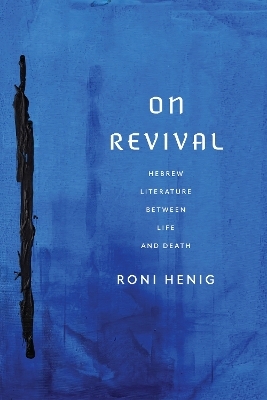
On Revival
Hebrew Literature Between Life and Death
Seiten
2024
University of Pennsylvania Press (Verlag)
978-1-5128-2660-9 (ISBN)
University of Pennsylvania Press (Verlag)
978-1-5128-2660-9 (ISBN)
A critique of the discourse of language revival in modern Hebrew literature
On Revival is a critique of one of the most important tenets of Zionist thinking: “Hebrew revival,” or the idea that Hebrew—a largely unspoken language before the twentieth century—was revitalized as part of a broader national “revival” which ultimately led to the establishment of the Israeli nation-state. This story of language revival has been commemorated in Israeli popular memory and in Jewish historiography as a triumphant transformation narrative that marks the success of the Zionist revolution. But a closer look at the work of early twentieth-century Hebrew writers reveals different sentiments.
Roni Henig explores the loaded, figurative discourse of revival in the work of Hebrew authors and thinkers working roughly between 1890 and 1920. For these authors, the language once known as “the holy tongue” became a vernacular in the making. Rather than embracing “revival” as a neutral, descriptive term, Henig takes a critical approach, employing close readings of canonical texts to analyze the primary tropes used to articulate this aesthetic and political project of “reviving” Hebrew. She shows that for many writers, the national mission of language revival was entwined with a sense of mourning and loss. These writers perceived—and simultaneously produced—the language as neither dead nor fully alive. Henig argues that it is this figure of the living-dead that lies at the heart of the revival discourse and which is constitutive of Jewish nationalism.
On Revival contributes to current debates in comparative literary studies by addressing the limitations of the national language paradigm and thinking beyond concepts of origin, nativity, and possession in language. Informed by critical literary theory, including feminist and postcolonial critiques, the book challenges Zionism’s monolingual lens and the auto-Orientalism involved in the project of revival, questioning charged ideological concepts such as “native speaker” and “mother tongue.”
On Revival is a critique of one of the most important tenets of Zionist thinking: “Hebrew revival,” or the idea that Hebrew—a largely unspoken language before the twentieth century—was revitalized as part of a broader national “revival” which ultimately led to the establishment of the Israeli nation-state. This story of language revival has been commemorated in Israeli popular memory and in Jewish historiography as a triumphant transformation narrative that marks the success of the Zionist revolution. But a closer look at the work of early twentieth-century Hebrew writers reveals different sentiments.
Roni Henig explores the loaded, figurative discourse of revival in the work of Hebrew authors and thinkers working roughly between 1890 and 1920. For these authors, the language once known as “the holy tongue” became a vernacular in the making. Rather than embracing “revival” as a neutral, descriptive term, Henig takes a critical approach, employing close readings of canonical texts to analyze the primary tropes used to articulate this aesthetic and political project of “reviving” Hebrew. She shows that for many writers, the national mission of language revival was entwined with a sense of mourning and loss. These writers perceived—and simultaneously produced—the language as neither dead nor fully alive. Henig argues that it is this figure of the living-dead that lies at the heart of the revival discourse and which is constitutive of Jewish nationalism.
On Revival contributes to current debates in comparative literary studies by addressing the limitations of the national language paradigm and thinking beyond concepts of origin, nativity, and possession in language. Informed by critical literary theory, including feminist and postcolonial critiques, the book challenges Zionism’s monolingual lens and the auto-Orientalism involved in the project of revival, questioning charged ideological concepts such as “native speaker” and “mother tongue.”
Roni Henig is Assistant Professor of Modern Hebrew Literature in the Skirball Department of Hebrew and Judaic Studies at New York University.
| Erscheinungsdatum | 15.10.2024 |
|---|---|
| Reihe/Serie | Jewish Culture and Contexts |
| Verlagsort | Pennsylvania |
| Sprache | englisch |
| Maße | 152 x 229 mm |
| Themenwelt | Geisteswissenschaften ► Philosophie ► Sprachphilosophie |
| Geisteswissenschaften ► Sprach- / Literaturwissenschaft ► Anglistik / Amerikanistik | |
| Geisteswissenschaften ► Sprach- / Literaturwissenschaft ► Literaturwissenschaft | |
| Geisteswissenschaften ► Sprach- / Literaturwissenschaft ► Sprachwissenschaft | |
| ISBN-10 | 1-5128-2660-X / 151282660X |
| ISBN-13 | 978-1-5128-2660-9 / 9781512826609 |
| Zustand | Neuware |
| Haben Sie eine Frage zum Produkt? |
Mehr entdecken
aus dem Bereich
aus dem Bereich
Aspekte einer Ontologie des Logos
Buch | Hardcover (2024)
Springer Fachmedien (Verlag)
119,99 €
Wie die Menschheit zu ihrer größten Erfindung kam
Buch | Softcover (2022)
C.H.Beck (Verlag)
18,00 €
Macht und Legitimität politischer Sprache im Prozess der europäischen …
Buch | Softcover (2023)
Nomos (Verlag)
74,00 €


